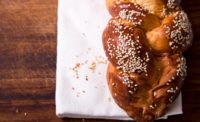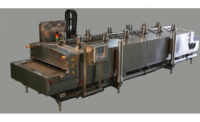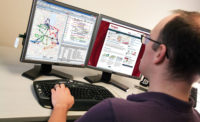Industrial commercial bakeries look to dough customization machines like water chillers, water meters, ice makers, and automated dough scoring units to improve and automate the dough process, primarily during mixing. They often have ideal target dough temperatures in mind for specific types of products, which means they need to meter in carefully measured amounts of chilled water and/or ice to hit their target.
Companies that make machines in this category say their customers seem particularly focused on features and benefits like flexibility, energy efficiency, differently sized applications, automation of processes, the ability to handle healthier grains like organic or gluten-free, and getting to the coldest possible water temperature above freezing.
Customers of Spraying Systems Co., Glendale Heights, IL, want machines that provide flexibility and the ability to adjust for qualities like the scored depth or length, says Josh DeVoll, director of marketing solutions. “We’ll get requests for zones—maybe one pan has eight pockets across, another has six. They need to be able to turn off different zones they’re not using.” That leads to greater energy efficiency and maintains a cleaner environment, he adds.
Requests for differently sized applications, not just larger mixers but also smaller batch loads, have been common among customers of Filtrine Manufacturing Co., Keene, NH, says Turner Hansel, president. “The chiller cools the jacket of the ingredient mixing bowl at a colder temperature than what is provided for ingredient water,” he says. “The gives the customer the ability to have greater temperature control. When the temperature of the bowl is controlled, the temperature of the dough can be maintained more accurately.”
Paul Mueller Co., Springfield, MO, hears frequently from customers who want to get their water temperatures as close to freezing as possible without it actually freezing. “Ice gives you an inconsistent product as far as the dough because there’s pockets of ice and pockets of cooling,” says Russ Williams, regional sales manager. “And it’s hard on the mixers, the beater bars and stuff—ice wears them down faster.” In short, Paul Mueller helps get bakers out of the ice age, he notes.
Customers of Beor Bakery Equipment, Sabadell, Spain, are moving toward automation of equipment so they can run more continuously, even on weekends or holidays, or when workers are on vacation, says Alberto Bozzola, sales area manager. “The customer is trying to invest more, in order to get the process even more automated,” he says. “It’s a question of labor. They want to cut down on labor but also to increase product consistency.” Customers also want to boost sanitation and maintenance, he adds.
The ability to handle products with health claims like clean label, organic, gluten-free, and ancient grains are top of mind for customers of Bakery Concepts International, Harrisburg, PA, which makes both Beor scoring machines and Rapidojet mixers, says Ken Schwenger, president. “That’s a fairly big category right now,” he says. “It can go very well with, for example, tortilla chips. A lot of those are multigrain, organic, and gluten-free. That’s a fairly big focus.”
New and improved
Spraying Systems Co. offers automated water scoring of proofed dough with a bread-scoring nozzle and high-speed valve, DeVoll says. “That allows us to do bread scoring with specialized tip sizes that we have found work best,” he says. “We’re able to control those at relatively high speeds, apply the scoring, and do things like stitching to get the right look for artisan-type breads. We can do water scoring, without knives, and we can hit different depths simply by changing the pressure on the nozzles.”
The company has a new line of spray control systems that allow for greater fine-tuning of nozzles and provide other features like automated maintenance schedules, DeVoll says. “It will give [operators] a reminder of certain things that need to be maintained,” he says. It also has Wi-Fi capability that allows customers remote access from their phone to get updates on the unit. “They don’t necessarily have to be in front of the machine.”
Filtrine has been producing chiller systems with greater redundancy, which can be particularly important for larger applications requiring increased capacity, Hansel says. These “can handle larger batches more reliably and allows more uptime for a dough line,” he says. “If a chiller needs to be serviced, the dough line is not down and can continue to produce product. With filtration and/or sterilization of the make-up water, they have better control of the water quality going into the mixes.”
Paul Mueller provides chillers for all sizes of bakeries from those that produce 40 gallons an hour—“up to as much water as they want,” Williams says. “We found years ago that bakes wanted consistent water temperature so their products are consistent every time,” he says. “They get 34˚F, 36˚F all the time.”
For those needing capacity beyond 240 gallons per hour, the company produces a falling film chiller, which provides a self-contained reservoir that bakeries can continuously fill with chilled water and draw out to as many mixers as they want, Williams says. Paul Mueller is currently developing and hopes to release later this year a medium-sized falling-film chiller that could handle 70 to 240 gallons per hour.
Beor’s water scoring machines provide a number of benefits, according to Bozzola. These include: flexibility to do straight, inclined, cross, and custom scores; ability to score very small products without moving or damaging them; no need to change blades; and no risk for the employee being cut, or blades breaking off into the baked good. The line of five machines are adjustable in terms of water pressure, speed, scoring height, and nozzle inclination, all of which can be done remotely if the machine is connected to the internet, he notes.
“You can score very small pieces of bread,” Bozzola says. “You can adjust the pressure depending on hydration and other factors. Then you can adjust the speed of the arm—the faster you move, the less you score. The deeper the jet of the water, the more it goes into the bread. Then you can get into different scoring types.”
Schwenger notes that adjusting the angle of the cut can change the look of the finished product. “With artisan bread, you want a nice open bloom on the loaf,” he says. Because Beor is able to change the inclination or angle, as well as the depth of the cut, through the pressure and speed of the robot, the system can provide any kind of score, he notes.
The Rapidojet line also produced by Bakery Concepts has garnered “multiple patents” in how it uses high-pressure liquidation in the mixing process, Schwenger says. Customers looking to reduce mix time, eliminate coolant and increase yield have been especially focused on areas like yeast-raised dough mixing and gluten-free products, including corn masa items like tortilla chips.
The benefits of Rapidojet include a reduction of 90 percent in mixing energy needed, 25 percent greater hydration level for gluten-free products, continuous mixing of between 4,000 and 7,500 kilograms per hour with a single machine, the elimination of the need for any coolants such as ice, and significantly reduced costs for energy, labor, worker safety, and maintenance and sanitation, Schwenger says.
For bread dough, Rapidojet reduces the tendency to “tail out, or get ‘bucky’” in terms of rheology because of incomplete hydration, he says. For tortilla chips and table tortillas made out of corn, using Rapidojet as a continuous mixer in the company’s patented vertical mixing chamber reduces labor costs by 80 percent and eliminates the need for batch mixing, Schwenger says.







